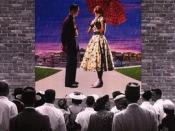How are we made aware of the filmmaker's attitude towards change? Refer to three specific episodes from the film. (excl. concl. stages)In Pleasantville, the filmmaker, Gary Ross, conveys his attitude towards change through the characters of David and Jennifer who are transported into the 1950s sitcom "Pleasantville". He doesn't necessarily demonstrate change to bear a positive result; rather, he addresses that change is essential to the development of society and self and that it is important to understand and accept change. Ross contrasts the ignorance and mindlessness of the unchanged people of Pleasantville with the hunger for knowledge that the changed (or coloured) people possess, communicating to the viewer that change and knowledge go hand in hand.
Ross also portrays and somewhat satirises an unchanged society's people to be ruled by their own mindlessness, and in their epiphany, translates to the viewer that change can come from within or from outside one's self but is different for everyone.
Dark overtones are used to parallel the Pleasantville to a society under fascist rule. However, in the end, change will always affect everyone and this new understanding will help to overcome the changes encountered in the future that may seek to detriment the society. The three scenes which will be discussed in relation to the filmmaker's attitude towards change are the breakfast scene, the classroom scene, and the rain scene.
The breakfast scene is the scene where Betty is piling food on other food and topping it off with maple syrup for Mary-Sue's breakfast. The audience is overwhelmed at the ridiculous amount of food that is being placed on her plate, which is shown by extreme close-up and cuts of the shots of every time another food item is slapped onto the plate, and is accompanied by an upbeat...


